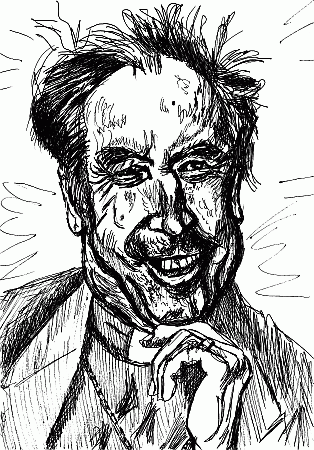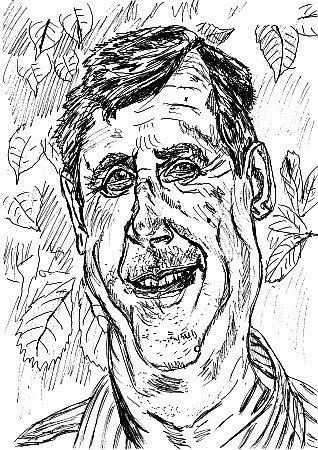|
The Lent group meeting in the Vicarage of St Mary's Church, under Vivienne Rowett's leadership discussed The Earth in Our Hands, the Lent course of Churches Together in All Lincolnshire
prepared by the Lincolnshire Churches Environmental Group in partnership with BBC Radio Lincolnshire. The well produced booklet offered five sessions with an audio CD element for each. Key persons heard were John Saxbee, Bishop of Lincoln, Terry Miller, Chaplain for Environmental Issues
and interviewer Sue Edwards, Religious Producer at the BBC.
|

|
|
The first session concerned being compassionate with the earth in the face of a claimed massive environmental crisis. We seem to have, as Westerners, plenty of money and little time, whilst the poor (in the wider world) pay the price of the crisis. This set the scene, offering the most overtly religious part in an arguably practical and even secular course, though even this came across as largely secular, introducing the idea that every little effort counts.
|
|
The prayer and readings each week perhaps appeared like a religious gloss on a self-contained subject of environmental care. Our religious examination of the readings was from our efforts, not the presentation's. On the other hand, the Lent course involved giving up profligate attitudes, and treading more lightly, which is itself religious.
|
|
A specifically Judaeo-Christian theme that did arise was the Sabbath; this related to the Genesis reading and was returned to in later weeks. It suggested pausing the production, consumption and work cycle, and finding other worthwhile activity. The sabbath is a glimpse of a moment of plenty: of activity in the Kingdom of God; I saw it as paralleled in Marx's end time of plenty with no competition for resources - but (in the Sabbath) just for a moment.
|
|
The second session was most focused on treadling lightly, because it was about transportation and we made a big effort to use a Judaeo-Christian insight. The reading was about Noah (using a ship) and its story of the Covenant from God with the whole earth (not just the people chosen to be holy). This Covenant comes after a holocaust of the flood and yet with nothing restored the bow in the sky can be seen as if God has laid down his weapon. We often have a very childish view of the Ark, but the story suggests a binding relationship with the whole ecology after and before paradise.
|
|
Much of our conversation moved on to matters not just of transport but technology in general (similar to the first week). We covered solar power, fuel cells, foreign hydrogen buses, co-ordinating railways with themselves and other transport, and whether or not the carbon footprint of air travel damages the environment.
|
|
Session three allowed everyone to indulge in the subject of shopping. Shopping relates to transport because goods travel such distances in a multinational system of retailing, which exploits at sourcing and hoovers up the competition where selling (using aggressive marketing of cheap and high margin goods and even land purchases to prevent future competition). There were important points here about consumption being ritualistic and ego-centred with rapid wearing out and replacement. This raised deeper questions of how the contemporary economy functions, returned to in the final session. The discussion turned to the movement of people in the world as consumers, producers, and even as identifiable "tribes" with identities; adding the rise of Chinese production, consumption and its exploited workforce with its rising middle class, and the European Union's strategy of economic integration as a means to prevent war among our tribes. The discussions every week had this freeform nature, going out from and yet reconnecting with the main topic. All the time it was back to what we as lowly individuals inside world capitalism can do - basically try to buy local products, produced organically or sympathetically, with care towards animals, via fair trade where possible. This impacts into choices of shops in a town such as Barton.
|
|
Session four was concerned with waste and then biodiversity in any garden, where we puzzled for a time over the direct relevance of the Parable of the Talents. Because it was unclear, it was lost to a mainly secular discussion in the two parts. Its capitalistic awkwardness is within its content: a likely coming together of different sources. The waste issue requires again doing small recycling tasks to make a difference, but most wanted the weekly general bin-emptying back! The conversation was again broad, with a return to shopping, about cooking from raw ingredients rather than processed food and included even craftwork in wartime.
|
|
The final session was as lively as the third one. Because it was a summary session, it led to a wide-ranging discussion on the workings of the economy, on the causes of global warming and the small scale ecological resource-saving efforts of an eco-office in Long Sutton
and especially a barn conversion in front of Sempringham church. By way of conclusion it was back to simple and practical steps: for the PCC it means environmental and cost awareness that might involve the sort of planning carried out by schools; for individuals it means alterations in behaviour and small efforts even as straightforward as using low energy light bulbs.
|

|
|
Throughout there was this contrast between the macro-situation that we should be able to change (but seem distant from economically and politically) and, as cogs in the big wheel, making a small impact that can add up. So once again we debated the movement of people throughout the world: in the decline of purpose in the former communist world and the contrast of poverty in the underdeveloped world, both leading to huge movements of people and changes to the labour market - production and consumption - in Britain itself.
|
|
There are two main overriding macro-issues of environment and economy. The bishop on the CD made fairly unstructured comments about God, the earth, humanity and trust.
|
|
First of all there is no reason why the earth should sustain humanity. We know that thanks to an object from space, and associated reasons, the dinosaur population humans never saw vanished, and so could we. We are the last human species, and one of our evolved human predecessors (but not an ancestor), the Neanderthals, lived with features that were readily adapted to the cold. Also the earth has heated and cooled without our efforts, and will do so. There is, additionally, considerable argument that carbon dioxide levels follow on from solar activity and are not the cause of warming
. Even if so it gives no excuse to foul up the earth by our actions, nor failing to live in accordance with the transience of all things - a spiritual task.
|
|
The second and related macro-issue is how our postmodern economy works. We used to think that wealth was in making resource-supplied things, which services distributed and financed. This is too simplistic, in that adding value takes place throughout the economy, including in information and entertainment. The economists work with statistics and graphs but in the end value is psychological: it is what we value. This wanting and chucking away "commodity fetishism" is an individualist mad cycle seen as necessary to keep people working, instead of, perhaps, having some people with highly productive capital earning (and being taxed) to redistribute this finance so that others add further value in socially desirable projects. We were reflecting a day after our "Protestant work ethic" Chancellor (salvation is in work and self-reliance) had delivered his final Budget. The huge level of private debt and international imbalances keep the balls juggled in the air, hoping they do not drop to the ground.
|
|
The argument is not about giving up technology, or against innovation. It rather takes us back to another discussion we had in the first week, about when years back we expected so much leisure time in the future for so many. Major economic tasks would be housed in technological institutions with distribution and maintenance passed down to smaller enterprises. Instead we have longer and longer working hours, and yet millions people sustained on benefits including an underclass in and out of low paid work (and an intelligent unemployed): a system chasing its own tail.
|
|
Taking both the environmental argument about transience and the economic argument about value, we perhaps need a different way of living, it being no less than a spiritual revolution of living. There are initiatives, like the Buddhist groups who sustain their own employment in vegetarian cafes and ethical food. Meantime the greater forces of human economy and ecology leave us to change ourselves just a little bit.
|
|
For five weeks we considered these matters, and hopefully weeks ahead in committees and individuals we can make some changes. Although a great deal of the talk was practical, it nevertheless was doing theology; although the religious element seemed at the time a gloss and having to be forced into the discussion, the two sides did come together in a theology against "commodity fetishism" and for a greater harmony with the whole.
|

